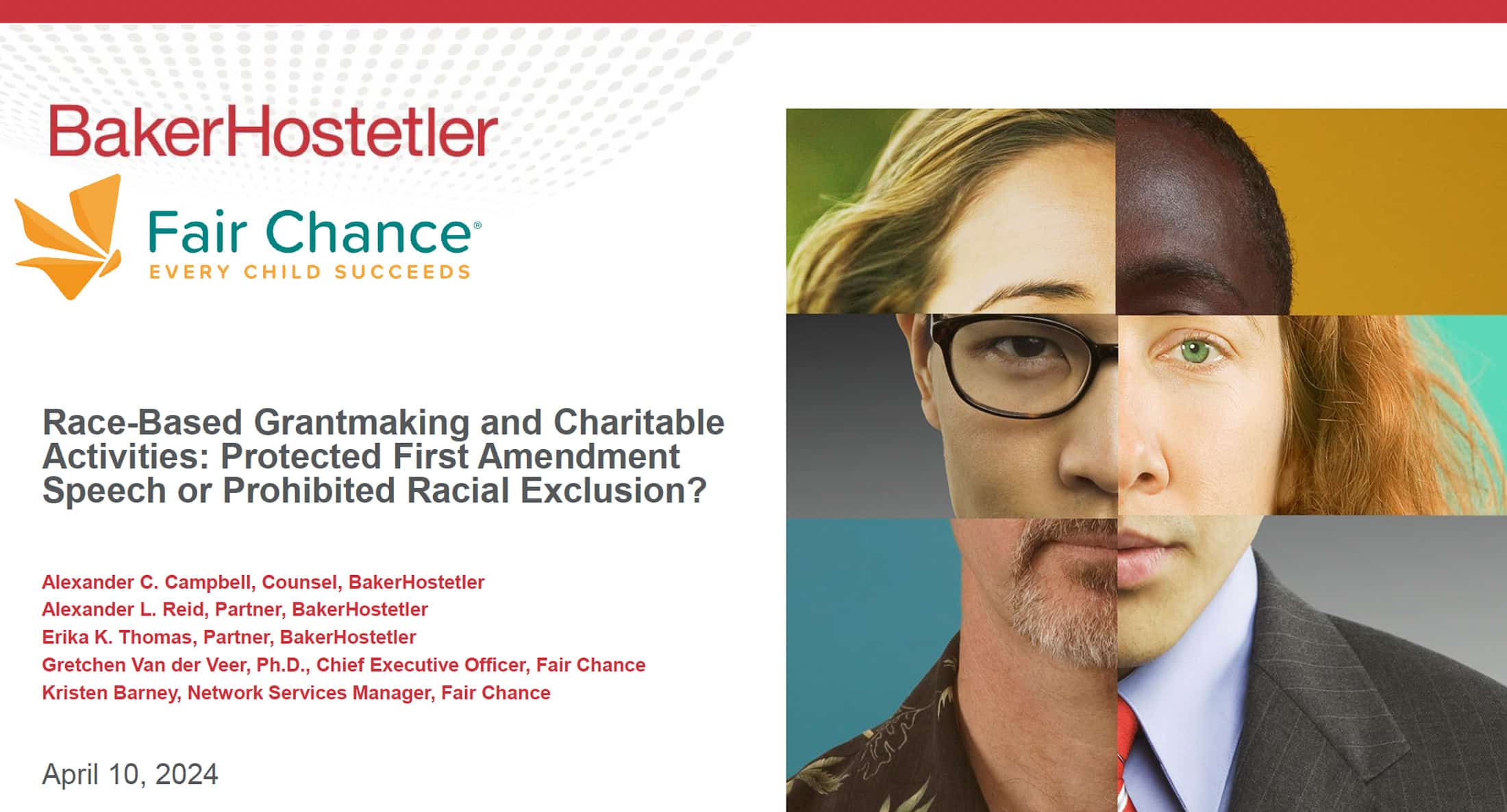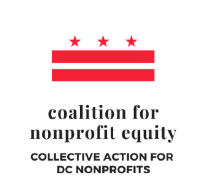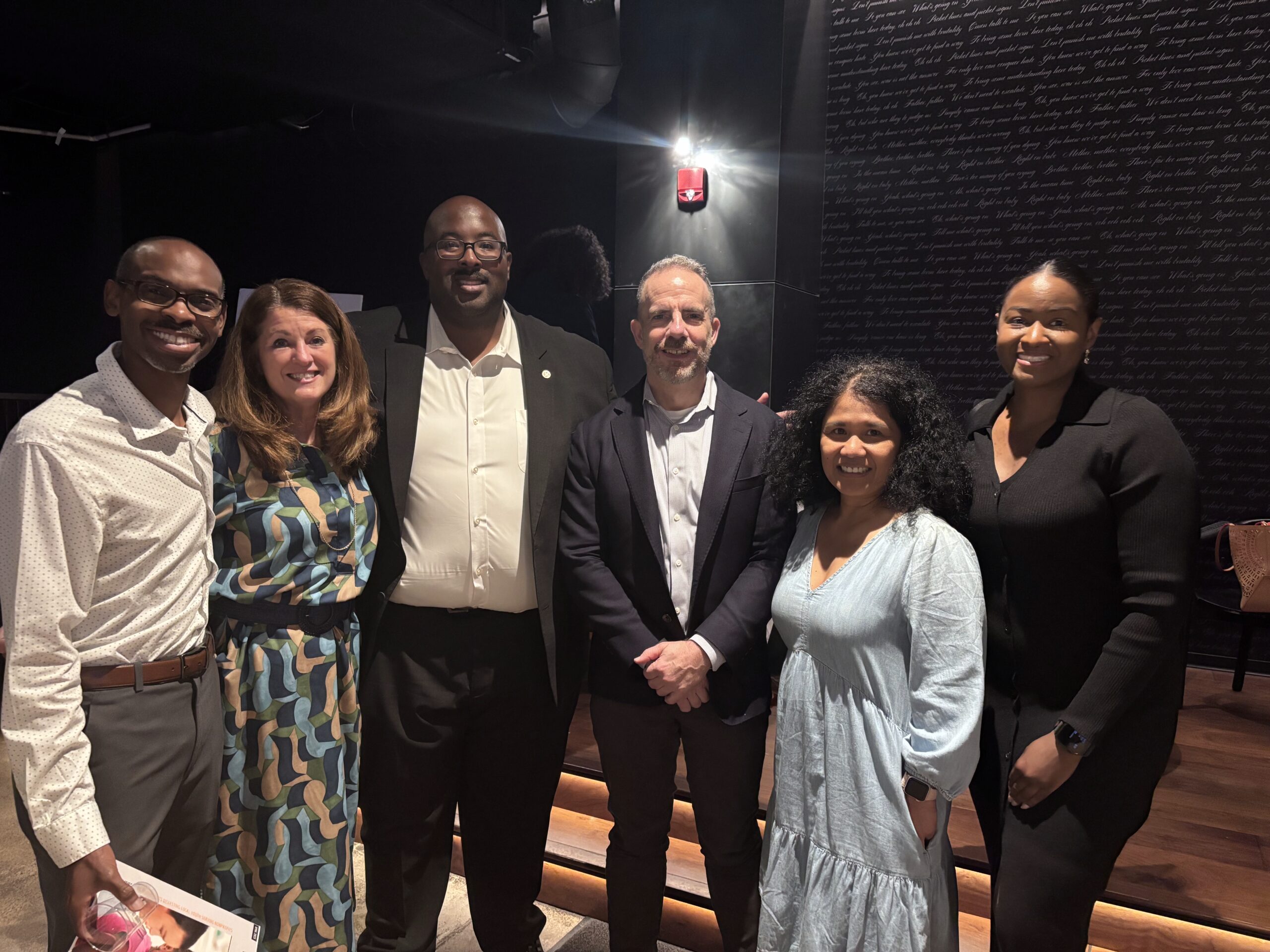
Fair Chance and BakerHostetler recently presented a webinar, Race-Based Grantmaking and Charitable Activities: Protected First Amendment Speech or Prohibited Racial Exclusion?, to raise awareness about current litigation which could be disruptive to both the nonprofit and philanthropic sector. The webinar also shares initial guidance on how to assess your organization’s risk and access resources to learn how to maximize your ability to continue race-based grant making and other charitable activities such as programming, scholarships, etc.
Courts Are Increasingly Focused on Reverse Discrimination: Last year, the U.S. Supreme Court held in Students for Fair Admission v. Harvard that the use of race in university admissions as a determinative factor without being part of a larger narrative regarding the applicant and the institution violates the Fourteenth Amendment. The same group of plaintiffs, funders, and legal counsel are engaged in a sustained effort to attack other DEI and racial equity and justice programs as unconstitutional racial discrimination against white individuals.
Why Nonprofits and Philanthropies? Nonprofit law has long held that race-based philanthropy is charitable activity. Yet in August 2023, the plaintiffs sued the Fearless Fund (a venture capital firm) and several related entities, including the Fearless Foundation, a 501c3 organization whose grantmaking program intends to bridge the gap in venture capital funding for women of color and to grow small businesses started by women of color. The case, American Alliance for Equal Rights v. Fearless Fund, challenges the legality of race-based grantmaking programs and other charitable activities involving race.
What Is the Status of the Fearless Fund Case Now? The litigation has deeply impacted the Fearless Fund, as some of their major funders have pulled out. Although the case has not yet gone to trial, in a preliminary adverse ruling against the Fearless Fund, an 11th Circuit Court of Appeals panel recently held in a 2-1 ruling that one of the Fearless Fund’s grant programs for women of color only is a “racially exclusionary program” and, therefore, “substantially likely to violate” Section 1981 of the Civil Rights Act because the grant is a “contract” within the meaning of Section 1981. Moreover, the 11th Circuit held that the Fearless Fund was unlikely to prevail on claims that the First Amendment protects its grantmaking program as expressive activity because the program is racially discriminatory conduct that is not protected speech.
What Could This Case Mean for Nonprofits and Philanthropies? Potential implications of an unfavorable ruling in the trial (and appeals all the way to the US Supreme Court) will vary by organization and charitable activity. Policies and procedures that might be impacted include the application and selection process for scholarships, grants and school admissions; terms and conditions for grant agreements; eligibility and selection criteria for program participants; and service obligations for grant recipients. For example, a nonprofit seeking to serve a specific identity group, such as Black or Hispanic individuals, should consult qualified legal counsel to revisit its mission statement and related program policy and monitor the need for potential changes if the final ruling in this case changes how the Civil Rights Act and/or the First Amendment are interpreted. The nexus between race and charitable programming is likely to differ from one organization to the next, depending on each organization’s mission, history and the charitable class it serves.
What Steps Can Nonprofit and Philanthropic Leaders Take Now?
- First, do not panic nor cancel your race-based grantmaking and programming.
- Second, engage your board and leadership and be in learning mode as follows:
- Watch the webinar, Race-Based Grantmaking and Charitable Activities: Protected First Amendment Speech or Prohibited Racial Exclusion?
- Review the webinar slides which include practical guidance on slides 18 and 19 on how to talk with your board about this issue and steps to take.
- Work with an attorney and evaluation specialist to learn how and why you should document the need for and measuring the impact of your DEI programs, policies, grantmaking, fellowship, programming, eligibility and selection criteria, etc. as part of your legal risk management relating to the Freedom Fund case.
- Register for the July 16 webinar, How the Supreme Court Affirmative Action Ruling May Impact Your Nonprofit’s DEI Policies & Mission from the DC Bar Pro Bono Center. When registering, respond “yes” to the question:
If available, would your nonprofit be interested in a risk assessment of your diversity, equity, and inclusion policies? - Consider purchasing and watching the Nonprofit Quarterly’s webinar (pre recorded) Racial Equity Backlash: The Response from Black Leaders & the Mandate for Action for $69.
- Sign up for the mailing list of the Decolonizing Wealth Project which is monitoring this case carefully and plans to develop resources to share.
- Finally, Fair Chance Partners, Alumni, Funders, and Stakeholders can reach out to your key contacts with questions or comments:
- Fair Chance Partners (currently in partnership) – reach out to your CBS or to your program Director (DC Programs – Anjali Nagpaul, anagpaul@fairchance.org; Prince George’s County Programs – Valarie Ashley, vashley@fairchance.org)
- Fair Chance Alumni Partners (completed partnership) – reach out to Kristen Barney, Network Services Manager, kbarney@fairchance.org OR sign up for an on demand coaching (ARCH) session here.
- Funders, donors, collaborators, media, and other stakeholders, reach out to Gretchen Van Der Veer, CEO, gvanderveer@fairchance.org; or Tamala Scott, Chief Advancement Officer, tscott@fairchance.org
Central Take Aways
As the BakerHostetler attorneys indicated in the Race Based Grantmaking webinar, “remedying racial discrimination is a charitable purpose under Section 501(c)(3) of the Internal Revenue Code,” particularly if your mission and organizational narrative affirm a commitment to the repair, reparation, and/or redress of racial injustices, past or present, programming/policies can be defended legally more easily. That means your programming and policies are consistent with the tax law. However, nonprofits and philanthropies do need to:
- Understand the provisions of federal law and the Constitution and how they apply to your work; specifically, avoid the use of race in a legally binding contract and be careful to connect any uses of race in charitable programming to the organization’s expressive activities and mission.
- Be mindful of the changing status of the judicial landscape, and assess the risk of their individual organization, programs, and policies with legal counsel that is well versed in these evolving legal issues.
- Philanthropists and nonprofits seeking to remedy racial injustice and inequity need to stick together, learn together, and remain committed and bold.



